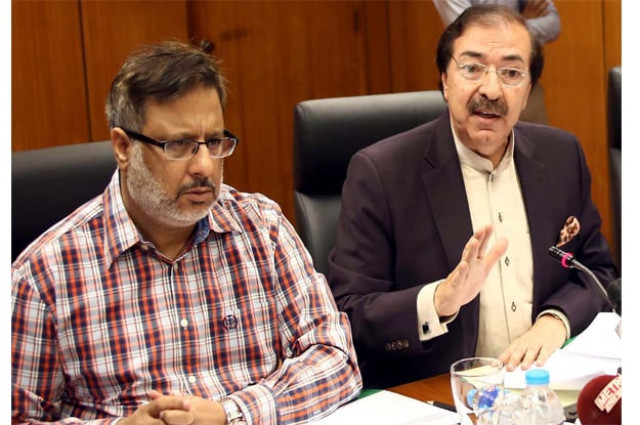We represent the entire textile industry: APTMA
Association defends itself after value-added sector accuses it of favouring spinners

All Pakistan Textile Mills Association (Aptma) Chairman Tariq Saud addressing a press conference. PHOTO: INP
The textile package, including the imposition of 10% duty on cotton yarn, will help all the sub-sectors of the textile industry, All Pakistan Textile Mills Association (Aptma) Chairman Tariq Saud said on Wednesday.
His remarks come after the value-added sector of the textile industry criticised the government for favouring the spinners.
The spinning sector faces competition from the import of cotton yarn, which has now been slapped with 10% additional duty. On the other hand, the value-added sector looks at importing what used to be cheaper yarn as raw material for making finished products.
Saud, however, said that Aptma - which pushed for the protection - does not solely represent the spinner sector.
Speaking at the Aptma house, Saud said the textile package will favour all sectors of the textile industry.
“It is a wrong perception that Aptma only represents spinners,” said the chairman. “We represent both spinners and value-added textile exporters and we believe this textile package will favour the entire textile sector.”
Saud said that out of the total $13 billion in annual textile exports, Aptma members’ share is close to $10 billion.
Replying to a question, he added that yarn exports constitute 20% of the total value of Aptma members’ exports, stressing that the rest are value-added textile products.
Aptma representatives have held long meetings with government officials including Finance Minister Ishaq Dar as they lobbied for support amid declining exports. Representatives of the value-added textile sector associations were also present in these meetings.
The government, after the meeting, announced 10% regulatory duty on import of cotton yarn, grey and processed fabric, particularly from India, in a bid to protect the domestic industry from dumping of cheap raw material in Pakistan.
The move pushes effective duty on the import of these materials to 15% as these items are already subject to 5% customs duty. The decision will take effect from November 1, 2015.
When asked whether local yarn makers will increase their prices after the import duty, the representatives of Aptma present in the press conference did not answer.
Aptma asserted that many of its members are also exporters of finished goods therefore, they can claim that the association represents the whole textile sector of Pakistan.
On the other hand, value-added textile exporters or the exporters of finished goods accuse Aptma of using its leverage over the government in getting protection.
Pakistan’s textile export share in the global market has decreased from 2.2% to 1.8% between 2006 and 2013. During the same period, Bangladesh’s share jumped from 1.9% to 3.3%, China’s share increased from 27% to 37% and India’s share improved from 3.4% to 4.7%, according to Aptma statistics.
The industry officials say energy supply mismanagement, comparatively high cost of energy, losing market access, lack of new investments, Pakistan’s bad perception, and bad policy implementations are the major hurdles that are holding back the country’s textile industry.
Published in The Express Tribune, October 22nd, 2015.
Like Business on Facebook, follow @TribuneBiz on Twitter to stay informed and join in the conversation.



















COMMENTS
Comments are moderated and generally will be posted if they are on-topic and not abusive.
For more information, please see our Comments FAQ